I clocked up one hundred, that is, 1 0 0, visits to the Newtown Gym on my last annual membership. That has been a goal for years, but in the last five years I have only managed ninety plus visits on a membership. The Newtown Gym is upstairs over Civic Video and the ANZ Bank on King Street next to the old Post Office.

My annual membership pays for itself after fifty visits. Were I to pay the per visit fee on each session, at fifty the cost would equal an annual membership. Get it? In that sense all trips to the Gym after fifty are free. During the working years fifty was the goal.

The routine is to rise at 7:00 a.m. and we walk the dog around the Camperdown Park while drinking the coffee we get from Russell at the Varga Bar on the way to the Park.
 The blurs are us moving along!
The blurs are us moving along!
Katie continues on home to the white orb – Majic’s bowl – to satisfy the inner puppy, while I peel off for the Newtown Gym two – four times a week. Après le Gym I return home for ablutions and eats. Doing it this way integrates the Gym into the day and gets it done. What doing it this way requires, is a conscious decision to dress for the Gym when we leave home. Morning appointments, mean I cannot go everyday. Phew!
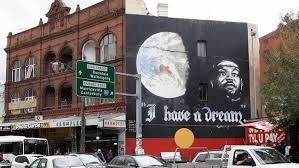 The mural is visible from the weight room and the Upper Torso Trainers.
The mural is visible from the weight room and the Upper Torso Trainers.
Dressing for the Gym? In addition to the sweat pants and shirt, which sometimes do get sweaty, it means taking along a water bottle and some amusement, either a book (or Kindle) and the iPhone.
I do some stretches in the continuing effort to reduce infernal leg cramps to which I am liable and shift some medals to see if they are still heavy. They are.
I avoid Saturday mornings, leaving these to the taxlings who crowd the Newtown Gym. Sunday mornings are very quiet as they recover from Saturday night. It is the noise as much as the crowd on Saturday morning. The classes are conducted to noise, er, music, that is ear-splitting. Are all gym class instructors in the pay of hearing-aid manufacturers? They are certainly going to make themselves deaf, if no one else. The blast from this noise blankets the exercise bicycles in an auditory miasma that I avoid. Some of it even seeps into the weight room.
Being at the clichéd edge, I use a gym app to keep on track and keep motivated.
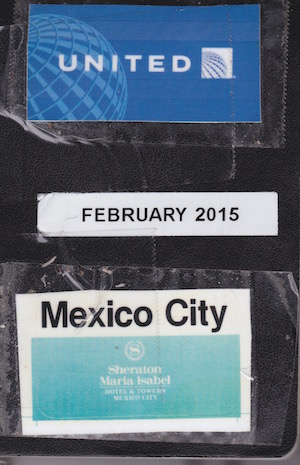 The day book. I used to get through four or five of these a year, now it is one or two.
The day book. I used to get through four or five of these a year, now it is one or two.
 The gym app
The gym app
This gym app has proven more reliable and durable than the Jaw Bone Up I had or the Garmin I now wear as a watch.
In between bursts of high intensity training on the bicycles (upright and low by turns) or the Upper Torso Trainers, I listen to podcasts. The best companion is ‘In Our Time’ from BBC4 hosted by Lord Bragg. He is a consummate seminar leader, and each week he leads three experts through forty-five minute discussion on this or that pitched at a general audience. This is intellectual candy of a high order. The topics are many and varied from archeology, physics, life sciences, history, literature, and more. He does one a week for about thirty times in a year. A considerable backlog of podcasts is now available on the BBC4 web site and I have been selectively going through them.
Somehow he manages to get the experts to slow down, spell it out, cut the armour-plated qualifications, eliminate the incomprehensible technical details upon which their careers were made, and talk on a level that an interested auditor can follow, whether the subject is imaginary numbers, Etruscan pottery, the human gut, Byron’s ‘Childe Harold’s Pilgramage,’ stellar spectroscopy, or water molecules.
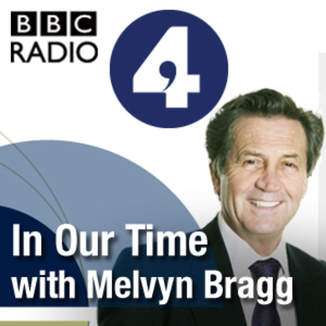
When his Lordship is not available, I turn to the daily ‘Writer’s Almanac’ with Garrison Keillor. More than once I have followed up one of Keillor’ s passing references, this podcast is short, to read John Hassler’s wonderful novels or to be stimulated anew by Emily Dickinson’s poetry.

And there is always ‘Lake Wobegon Days’ out there on the edge of the Prairies.
For those who must know everything, on days when I do not go to the Newtown Gym, I lift some hand weights on the balcony of the Ack-comedy and do some leg stretches there, watching the world go by, or watching the traffic jam back-up on Erskineville Road. There are some days when I do neither the Gym nor balcony routine.
Close readers, are there any other kind, will notice that is ‘annual membership’ and not a year of which I write. The membership is suspended when I travel. Last year that probably amounted to five weeks. Ergo the one hundred visits occurred over a period of fifty-seven weeks, not fifty-two. Surely that makes someone feel better.
‘Henry Wood Detective Agency’ (2013) by Brian Meeks
The first in a series of self-styled noir mysteries set in January 1951 in the Big Apple. A very easy read with many short chapters and some interesting characters, and then there is that closet which, like Henry, I thought was going to be explained and wasn’t. I kind of liked that. There was also plenty of woodworking.

It is at once very conventional and somewhat unconventional. The tough cop. The honourable criminal. The femmes fatales, who turn out to be OK. But mostly it is connect the dots. There are some bons mots but it does not crackle.
There is no tension and the characterisation is left to the woodwork. Too many chapters started with a new character who proved to be ephemeral anyway.
The rapprochement between the food critique who has an office nearby (and not at the newspaper for some reason) and the tough cop is not convincing, not interesting, and not relevant. They will probably appear in later titles in the series.
The mystery is that closet where occasionally Henry finds gifts from the future for both his hobby of woodworking and his job of detecting. That and Bobbie the motor-mouth estate agent who seems to know Henry’s business better than he should.
 Brian D. Meeks
Brian D. Meeks
Left me unsure if I want to read another one in the series.
I read it as a Kindle book. My second.
‘Bolívar: American Liberator’ (2013) by Marie Arana.
What do Venezuela, Colombia, Panama, Peru, Ecuador. and Bolivia have in common?
Simón Bolívar (1783–1830) was president of each, often simultaneously, sometimes in turn.
Bolívar cropped up in a book about Jeremy Bentham’s crusade to influence events in South America. Bentham corresponded with Bolivar, that is, inundated him with manuscripts, letters, books, telling him what to do. When I read that, I was remind of how little I know about Latin America, and reading a biography of The Liberator seemed a good place to start. Though truck with Bentham made me doubt Bolívar’s judgement.
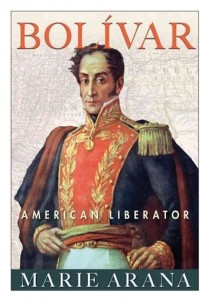
The first thing to hit me was that when Bolívar was born, the Spanish, including his family, had been in Latin America and the Caribbean for more than 250 years. That is far longer than the European settlement in Australia today.
The first Spanish settlers came on the second and third visits of Columbus a few years after that first landfall on 1492. That was a long time for people to get set in their ways, for the population to grow, for the natural wealth to be plundered, for social structure to map onto the topography, for the bureaucracy of empire from Madrid to develop arthritis, for the local Spanish to resent and yet to defer to distant Madrid. And the distance was measured in months of sea travel which was both uncertain and made dangerous by weather, politics, and pirates of the Caribbean.
Bolívar was born in Caracas in what is now Venezuela to a Creole family of wealth and social distinction. ‘Creole’ in this case refers to those Spanish who were born in Latin America as distinct from ‘Peninsulares’ who were Spaniards born on the Iberian peninsula. This distinction had social, financial, and political dimensions. Peninsulares were of higher status because they were closer to Spain. They escaped many taxes that applied to Creoles. They held appointed offices under the crown denied to Creoles. At one time, such differences might have made sense and might not have been resented but they were unchanged for 250+ years and they chaffed. The more so because those Peninsulares who came were often adventurers, thieves, and incompetents, each bearing a royal license that put them above the law.
The native indian population had either fled the Spanish who remained on the coasts or succumbed to the European diseases that came with them. To labor in the silver and gold mines, and later to work the sugar canes fields, the Spanish imported slaves from West Africa on a large scale and had been doing so for generations when Bolívar was born. Thus were three races mixed and while the sclerotic civil law took little notice of racial distinctions, the Roman Catholic Church did in regulating marriage, registering births, and legitimating inheritances. Racial purity was also a priority to the Creoles in their status war with Peninsulares. There were many varieties of pardos and mulattos, those of mixed race.
Bolívar was widely travelled, through the United States recently after its War of Independence, France shortly after the Revolution, England where he met James Mill, Italy, Spain, and elsewhere. In Spain, such was his family wealth and social status, he sported with Prince Ferdinand who became king during some of the period that followed. He had a tutor who spoke but the rights of man and talked but Rousseau and that ilk. Though Bolívar had no education to speak of, his head was full of ideas in a time when anything seemed possible. Born to a rich family, he never had an occupation of any sort.
A conflict between the reigning Spanish king and his ambitious son, Ferdinand, divided loyalties in Spain. Napoleon entered and placed one of this flunkies on the throne. The several colonies in the New World were even more confused than their brother French colonial officials would be in 1940 with the competing Vichy and Free French governments. Spain had three kings, the old king, his upstart son, and Napoleon’s puppet. In addition there were two rival juntas that each proclaimed the end of the monarchy and the birth of a new Spain. None had much capacity to influence the New World, but its riches were certainly what prompted Napoleon’s intervention, which in turn prompted the Monroe Doctrine in a few years.
There were many reactions among the colonists along the South American coasts as the news made its way to them, reported in English newspapers on American or British ships, since they dominated the seas.
In this confusing time Bolívar wanted both independence from Spain and a social revolution, though I doubt he translated that into the loss of his own fortune, though he did lose it. He was one of the most belligerent of the Creoles, and as efforts at moderation failed, because such capacity as Spain could project was repressive – no negotiation, just mass hangings. Several treaties between local Spanish officials and obstreperous Creoles were violated within the hour of signature, like the treaties the United States made with indians.
 One of many films featuring El Liberator
One of many films featuring El Liberator
I have no sense of Bolívar as a soldier. He had no training and his army was at most a few thousand. There are references to him training’s troops but I cannot guess in what he trained them. The terrain between the coastal colonies was forbidding, there being no roads, and simply moving a body of me from one to another was a feat of Hannibal.
He started with seventy men, surprised and routed a slightly larger Spanish garrison, and marched on with two-hundred men. By bluff and some confusion managed to cause another, larger Spanish contingent in a fortress to retire. Again he recruited more men, now at 500-hundred and marched on. This is another of his distinctions. He kept going. When other rebellious leaders scored a victory, they stopped. Not Bolívar. He was now about twenty-seven.
It is a long story with many failures, but Bolívar did not quit and in time learned from mistakes. The first lesson, was that it would be a long road.
Second, that the Latinos would have to do it for themselves. England would not intervene, though it would encourage from time to time to undermine its European enemies. The USA might be a model but it would not intervene either having neither the capacity nor will to do so.
Third, unity was the key to besting the imperialist, unity of the races, Creoles, pardos, mulattos, mestizos, blacks, and indians, and also geographic unity. He saw a single Latin American republic as the future. He opposed slavery and outlawed wherever he went which alienated the Creole slave-owning class of his origin.
Fourth, with a navy the Spanish could, at times, control the coasts, so better to operate from the interior.
Fifth, take allies where they can be found, and one place material support could be found was with the black regime in Haiti.
Sixth, compromise to amass a force. Do not insist on ideological purity from allies. Accept minimum cooperation if that is all there is.
Being a frail human being like all of us, El Liberator did not always follow these rules.
Since all the empires, French, Spanish, and English, constrained trade, the one place in the Southern Hemisphere where free trade was practiced was in Haiti. Several wealthy merchants from the United States had set up there to do business, and the offered funding, investing in future trading opportunities that would result if Spain was divested of its colonies.
Applying these lessons was not easy. Many fainthearted people wanted complete victory by the afternoon, or would quit. Others tried to woo England to no avail. The divisions among the Creoles and the ambiguous role of the Catholic Church, these alone would be enough to flummox most of us, let along crossing racial and geographic boundaries. There were no roads in the interior making movement nearly impossible. For some Creoles who had owned slaves, alliance with Haiti, a regime created when slaves massacred their owners, was impossible, even more impossible that freeing their own slaves.
That seeking of allies also came to mean trying to entice Spanish soldiers to switch sides with promises of citizenship and reward. His wars went on for more than twelve years as he criss-crossed the northern tier of South America in the belief that if the Spanish retained even one insignificant foothold, they would, sooner or later, return in force and subjugate the continent; it had to be a clean-sweep fore and aft. Alpine peaks in the Andes, swamps along the Orinoco, high deserts in Peru, jungle forests in Panama, endless plains, all these had to be traversed with his bedraggled followers. Nature and disease probably killed more than did the Spanish.
Bolivia, Ecuador, Panama, Columbia, Venezuela, and Peru, from these he drove the Spanish. The geography means nothing to me but on a map it is pretty impressive, putting George Washington’s campaigns into the shade.
There were constant conflicts among the locals, some remained loyal to Spain, but even among the anti-Spanish there were many deep divisions, social, racial, religious, regional, and political. Bolívar concluded that three hundred years of Spain’s authoritarian rule left the people incapable of ruling themselves. Though he adopted the forms of popular sovereignty, the governments, such as they were, he created were authoritarian, too. But he seldom stayed anywhere long enough to impose his will; he was always off to the next battle with another Spanish enclave. When he left, the government he had created fell to ruin and conflict.
His armies never exceeded 12,000 and were usually smaller than that. The wheel of death did not seem to phase him in the slightest. Over this period about half of the European population died. Add to that the deaths of blacks and reds and all the shades in between. Many deaths came from diseases for which we now have vaccinations, but even some them trace to the wars when water is contaminated, or populations re-located, or the dead are left unburied. Perhaps 50,000 soldiers died under his command. Of course, that is one battle for Napoleon.
Though the author describes many battles, it is all too much like a game. As far as I could tell Bolívar’s main tactic was to attack head-on. There is little indication he studied the terrain, disposed his forces according to it, tried to understand his opponents’ mind and play to a weakness, as did Robert Lee. Whatever tactical achievements there were, usually came from subordinates who also recruited soldiers of fortune from the demobilised armies of the Napoleonic wars with promises of citizen, land, and wealth. British and French veterans who had fought at Waterloo entered his European legion as comrades. He also bought much war surplus weaponry from Europe after 1815.
The author does a nice job of contrasting Bolívar with San Martin, though she is very clearly of the Bolívar camp. Think I will read about San Martin next to get the rest of the story. Over a 48-hour period they had three private meetings, alone. We know nothing of their discussions, though inferences have been made from the subsequent letters and memoirs of each. Nonetheless, the author writes of these interviews as though present. A license too far, I thought.
For ten years Bolívar fought the Spanish coloniser from Peru to Venezuela and back and forth. When the Spanish finally left, he spent the next ten years trying to hold together Greater Granada, as he called it, consisting of Venezuela, Colombia, Panama, Peru, Bolivia, and Ecuador. As soon as he left one province, as he styled them, the conflict would start. No longer having the Spanish to fight, they fought each other, across provincial, later national, borders, between cities, and within cities.
While El Liberator still lived, Peru had three presidents in one week, the first assassinated upon taking the oath of office, his successor two days later so that third took office on Friday. In combinations of twos and threes the states he created made war on each other and still do.
Once the Spanish oppressor was vanquished, many people saw in Bolívar a would-be king, tyrant, dictator… and opposed his every step. So blind was their automatic reaction — think Fox News here — that they even opposed his efforts to resign, seeing in it a devious tactic to win recall. That makes about as much sense as does Sarah Palin. This opposition continues with the entry in Wikipedia which asserts in its opening paragraph that his aim was to secure personal fiefdoms. No doubt it will be edited by next week.
He died at forty-seven, aged decades beyond the years by the exertions of the soldier’s life. The author estimates he travelled 75,000 miles, most of it on horse or foot in Latin America. At death he was penniless, and outcast by the very people whom he had liberated from Spain, dying in the care of a retired Spanish diplomat in a remote location in Colombia.
In death he has been a reliquary for Latino political leaders to bask in the glory of El Liberator, Simón Bolívar. Whenever a regime wobbles, its president-for-life unveils another statue of El Liberator, most notably and recently the late Hugo Chavez.
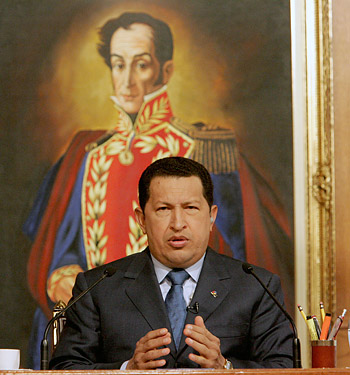 Chavez speaks
Chavez speaks
Though no one wanted him alive, Bolívar’s body has been dug up and divided among nations and moved several times, last by the aforementioned Chavez who also took his name for the country as the Bolivarian Socialist Republic of Venezuela. It seems there are no parks or plazas in the northern tier of Latin American without statue of El Liberator from Panama to Bolivia. It does not always work since Swiss hotels are fully occupied by such presidents-for-life.
I mentioned the egregious Jeremy Bentham above and also Montesquieu. One of the interesting themes in this story is whether the laws must be rooted in the society or must the laws be above and apart from the society, and this is a difference between Bentham for whom one-size, his, fits all and Montesquieu for whom the spirit of the laws is the spirit of the people. Intersecting with this argument is one about monarchy. Though Bolívar was unalterably opposed to monarchy, many of his allies and acolytes wanted to recruit a European prince to be king on the grounds that such an outsider, having no history and no loyalty to this faction, region, or race, could defend a constitution against the ebb and flow of local politics. It is an argument Georg Hegel made in his ‘Philosophy of Right’ (1821). That did not work well for Max in Mexico a generation later.
The last chapter is a superb summary of El Liberator’s life and career.
——————-
The book is based on extensive research and is written with panache, and of course, the basic story is both an epic in scale and a saga in duration. I read some of it with the Times of London Atlas open to the relevant page to follow some of the action since most of the place names meant nothing to me.
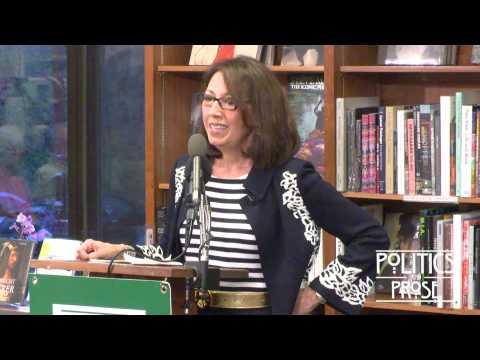 Marie Arana
Marie Arana
It is also true that the book lapses into hagiography too often for Saint Símon. It labels but does not explain, e.g., when others failed or quit Bolívar succeeded, why? Because he was charismatic comes the answer, which is no answer at all.
Some very strange word choice and some minor historical inaccuracy, e.g., there were no rifles and no artillery. The rifling of the barrels of weapons came later. There were muskets and cannons. It is quite a difference on each side of the barrel. When she writes of ‘riflemen,’ unless she specifically has Chuck Connors in mind, I think she means ‘infantry.’
Annoying overstatements, e,g,, these horsemen were the most audacious in the world. How does she know this. Was there a world horsemen audacity ranking agency?
At times the word choice made me wonder if the author, or translator, was a native English-speaker.
This is the first book I have read from beginning to end on a Kindle. It has taken getting used to, especially for notes and highlights and not losing my place. I started with turning off the public notes and highlights of other readers. No thanks. That is too much like reading a used book marked-up by previous readers. Bad enough reading some of the asinine reviews on Amazon.
Having carried about thirty kilograms of books on our European tour last year, I decided that I would not do that again. The only way to do that is to use a Kindle so I am practicing that before our next jaunt to Turkey in October.
‘Oscar Wilde and the Vatican Murders’ (2012) by Gyles Brandreth
The fifth in the series and better than ever. Oscar Wilde and Arthur Conan Doyle were friends, and the premise of this series is that Wilde is the model and inspiration for Sherlock Holmes, with his encyclopaedic knowledge, instant perception of facts, computer like processing of information, grasp of new languages in minutes, bolt holes here there and everywhere, mastery of disguise…
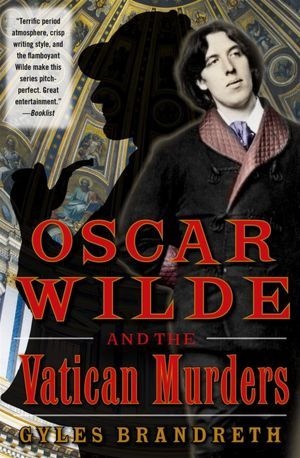
In this entry, Wilde and Doyle travel to Europe, each to escape his adoring fans, for some R and R. But no sooner do they check into a hotel than the game is afoot.
Doyle receives some strange mail, forwarded by his publisher, addressed to Sherlock Holmes. That has happened before, but not like this! Doyle shows and tells Wilde, and Oscar insists that they follow-up.
Toute Suite the trail leads to Rome and to the heart of Rome in the Vatican. Once in the eternal city, Doyle takes things as a they seem to be, but not Oscar who sees mystery and deceit in the very air. Some of the scenes occur under the dome of St. Peter in the dead of night.
 Gyles Brandreth
Gyles Brandreth
The period details, the travelogue, the dialogues, but most of all the stolid Doyle as Waston to Wilde’s mercurial Holmes is a great fun.
Take one Greek crisis and add some Menckenium, then stand back!
Warning! Diatribe ahead.
Reading about the Greek fiscal crisis has been unavoidable, and I have also been reading a biography of H. L. Mencken. What a combination! Menckenium is a dangerous substance in the hands of an amateur like me. What would HL make of this? Polemic and invective, these were his fission and fusion.
He would excoriate all those saps who feel sorry for Greece, which, after all, sold government bonds with sovereign guarantees to European, American, and Australian banks. The money that the banks paid for those bonds went somewhere. Where did it go? Come back little Euros. Come out, come out, wherever you are!
Imagine the outcry at the time if those banks had refused to buy Greek government bonds on the grounds that it was not likely repay the money! Those now wrapped in Greek flags would have screamed for the banks to buy those bonds! Our sovereign guarantees are as good as anyone else’s! The isms would have filled the air: racism, nationalism, stupidism.
There would have been protests on Syntagma Square, demanding that the bonds be bought just like those of…., er, Portugal, Enron, Spain, and Italy.
Those around the world who now inflate their egos by feeling sorry for Greece instead of thinking, would have rallied to the Greek cause. So much for the pathetic claim that predatory lending was somehow at the root. When I read that I laughed louder than at Donald Trump, and that is saying something! (This man brings his own fright-whig. A trouper for sure.)
Who will buy Greek government bonds from now on? Hands up, all those ready to plonk down their life savings!
Then there is the perfectly idiotic claim that the money need not be paid, because after all the creditors are B A N K S.
People are important. Banks are not people. Greeks are people. Therefore Greeks win!
What kind of thinking is this? A kindergarten syllogism? My dog is capable of more complex reasoning than this.
As Angela Merkel has said many times the lending banks were investing pension funds in sovereign bonds, a conservative investment with a low rate of return but very secure; that’s why it is called sovereign debt. That is what most pension funds do, opt for high security at the price of a low rate of return.
Indeed, I have seen the point made in a German newspaper that one of the pension funds exposed to Greek debt has a great many retired Turkish immigrants on its books. It turns out Turks who have worked in Germany have no desire to write off Greek debts. So much for the supposition that banks are inhuman constructions of the aliens among us. (Their are aliens among us, to be sure, and they are hiding in plain sight on Fox News. Check out the mutant little fingers! [You either get it, or you don’t. Explanations are not included.])
Somewhere along the way I noticed the assertion that the Greek government could not repay the debt since Greek voters had voted against it. Talk about a stacked deck! If I could vote against paying the house mortgage, let me at that lever! Ooops, too late, already repaid with interest. I will side with Aristotle on this one, when he says in ‘The Politics’ that a new regime had best honour the debts of the old regime.
Then there are arguments from authority. An old favourite in the classroom. ‘A Nobel Prize winning economist says thus and so….’ and that must be the final word. Hmm. This particular Nobel winner has a track record of one blunder after another since the Prize went to his mouth. He is displacing Linus Pauling’s long-standing record for the most embarrassing gaffes by a Nobel Prize winner.
Finally, the very first claim the Greeks made, which is still coded in the reactions, is that Germans are all Nazis and to hell with them! Nothing Germans say is reported on the BBC or the ABC websites. Facts are unnecessary when reactions are so ready. ‘They can afford to pay, so let them pay.’ Really? This is too imbecilic to merit a response. Well, maybe a little response: that many of the purchases of bonds were laid off to other banks in the United States, Latin America, and yes, even distant Australia. Those who want higher mortgage rates, put those hands up now!
Greek-debt deniers line-up with climate-change deniers, Catholic Church pedophile deniers, Aboriginal-slavey deniers, Holocaust deniers, Shakespeare-wrote-it deniers, Moon-landing deniers, Flat Earthers, and the aliens-did-it mobs.
Where will this all end. I dunno. But I do know that Italy, Spain, and Portugal are waiting in the wings. Any concession Greece gets, they, too, will want it. Retrospective is OK!
Meanwhile, Great Britain has learned for another generation or two the importance of staying out of the Euro(pe).
Full circle comes around to the question of where all those Euros went in the first place. No one seems to be interested in pursuing this matter. I do hope some of them were salted away in Cyprus! Where…’hocus-pocus’ they disappeared when the Russian mafia occupied the island without firing a shot.
Reducing complex matters to simple slogans, and demonizing others, that is civilised debate as we know it.
To the H. L. Mencken in me, this is all a laughing matter, like religion, democracy, and the ABC’s self-righteous efforts at news-reporting, but the last time a Greek government had a financial crisis of its own making, in order to distract attention from that, it started a war with Turkey in Cyprus.
The rowdy scenes in parliament in Athens and the endless protests in Syntagma Square, makes me wonder what the generals are thinking. They are all Maoists at heart: order grows out of the barrel of a gun, said the Great Helmsman, while slaying his countrymen by the millions and becoming a hero to the brain-dead in the West.
I hesitated to write this because I supposed I would earn a torrent of abuse from those rushing for a selfie atop the virtual barricades, but then I realised, none of these people would bother to read it anyway. Just to make sure they did not read it, I did not include any graphics. Why write it then? All bloggers know the answer to that: Because it is there.
Wait! The Oracle speaks! Those who react to my diatribe will:
1.Accuse me of committing the same errors I input to others. This is SAP (Standard Arguing Procedure) practiced by…saps, of course.
2.A second ploy will be to reach some one technical aspects among the myriad and assert this undermines the argument.
3.A variant of two above is to find a typo and claim that it means the whole work is useless. I always include a few typos to draw off these microbes.
4.Of course, all the existing justifications can also have an encore, starting with various false historical analogies only vaguely understood by those looking for support for a position already determined.
‘The Dog/The Cat’ at the Belvoir Theatre
It is not often that I hear my own department at the University of Sydney mentioned on stage, but it is in this production.
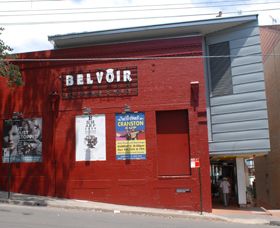
We entered committed to dogs in the eternal world war between the canine and feline, at the end we had to admit that the cat stole the show.
But as any dog will say, the problem with the first part of the title above is that there was NO dog. What is a dog to do if it is not there? That sounds like a Zen question. Moving on.
The staging was exhilarating. The players were exuberant and mournful by turns as we charted the ups and downs of the love lives of the principals.
It is sold out for the remainder of this season but there is a waiting list for cancellations. That might be worth a try.
I booked long ago after reading a review, but when Herself asked me on the night why I had wanted to go I had forgotten the substance of the review. It didn’t matter. The show sold itself. No mediation required.
“Mr Holmes’ (2014)
Dear diary,
We went to see ‘Mr Holmes’ at the Newtown Dendy last night. I am glad we went but I found the film a disappointment. First, the molasses, and then the vinegar.
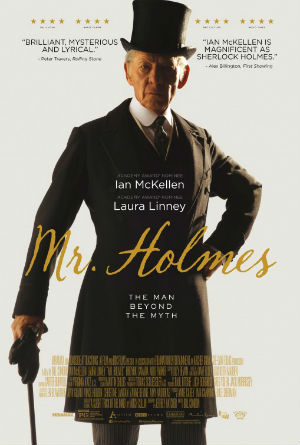
It was a pleasure to watch Ian McKellen hold the camera. Marvellous is this old trouper. And what knees he has for a man born in 1939.
The story does draw from the well of Sherlockiana. Holmes did retire to keep bees on the south coast near Dover. He did have a brother Mycroft whose reach was international. And there were nice touches, e.g., that 221B Baker Street was a false address to mislead curiosity seekers. The glass harmonica pricked my interest and off I went to Wikipedia to be informed. We also cackled at the film within the film, in part because it looked like more fun.
After Hamlet and Henry IV, Holmes must be among the most sought after roles in British drama. Yet having said that there is no Holmes from Laurence Olivier and the other celluloid knights. McKellen certainly lives up to the standard. It was because of him we went, as it was because of Robert Downey that we did not go see his 2009 travesty,
McKellen at 77 convincingly handles the various flashbacks and forwards from 93 to 58. Though what the point of the flashbacks and forwards was, that was lost on us. It just seemed pointless to put Holmes in Hiroshima. The film is based on the novel ‘A Slight Trick of the Mind’ (2006) by Mitch Cullen for those who want to make up their own minds. Perhaps it makes more sense there.
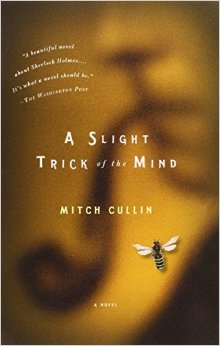
The supporting players were fine, though it was all so predictable. Mrs Munro was just cardboard. Full marks for transforming American beauty Laura Lynney into this Devonshire frump. Roger goes from monosyllabic to articulate in one scene. Me thinks also, the author of the screen play has not spent much time with the elderly. It is not just not remembering but not knowing that one is not remembering. When it is gone; it is all gone. One does not struggle to remember, rather it is gone without a trace.
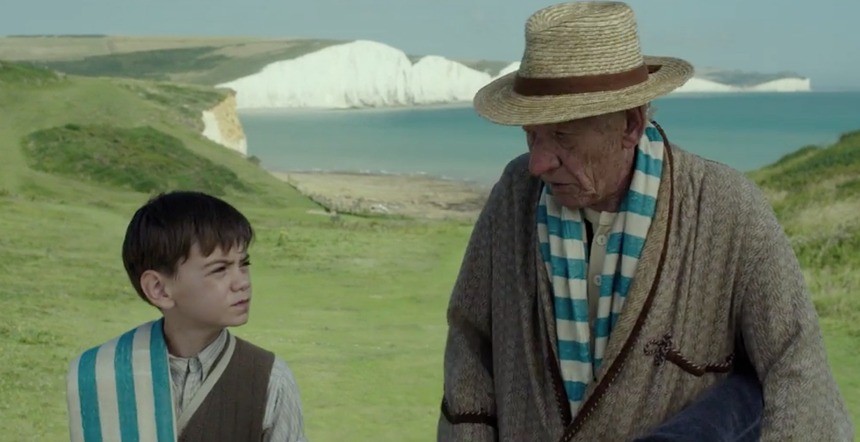
The mystery of beehive murders, now that would certainly have been enough plot for a good film, about Holmes passing the baton — the deerstalker — to Roger, but that was nearly lost in the all the flashes this way and that until it was needed to find somewhere to end.
The setting along the white cliffs was nice but throughout the cinematography was washed out and blurred.
‘George W Norris’ (2013) by Gene Budig and Don Walton.
George W Norris (1861-1944) of McCook Nebraska did much to make the United States what it became. He represented the third district in Congress for ten years, winning five elections, and then went to the United States Senate where he served five terms, thirty years.
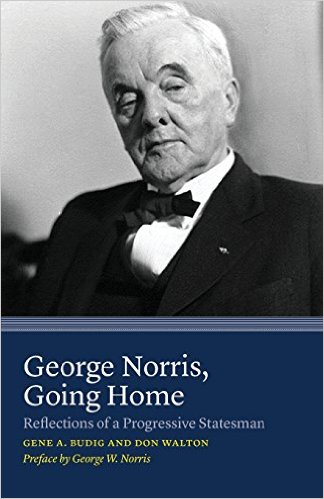 Published in 2013.
Published in 2013.
He supported and championed liberal and progressive causes, as did so many of his fellow Republicans in the era of Teddy Roosevelt, but if Republicans changed, Norris did not.
He left his mark in three distinct ways, one in Nebraska and the other two nationally.
1.During World War I the Federal government built a cataract of dams and power stations in northern Alabama at Muscle Shoals to power factories to produce munitions. At the end of the war, the assumption was that it would sold off for a few dollars to commercial interest who would exploit the complex of energy and factories.
But why should private corporations reap the benefit of the immense public investment in the complex, asked George Norris who then introduced a bill to have the Federal government operate the complex as a public utility.
This was socialism, cried the business interests, which grudging lifted the offered purchasing price a few dollars. Norris lobbied hard, bombarded the press with facts and figures during the Coolidge administration, and, because his opponents underestimated him, he secured a majority vote for his bill in the Senate. The first time it passed, it then died in conference committee with the House of Representatives.
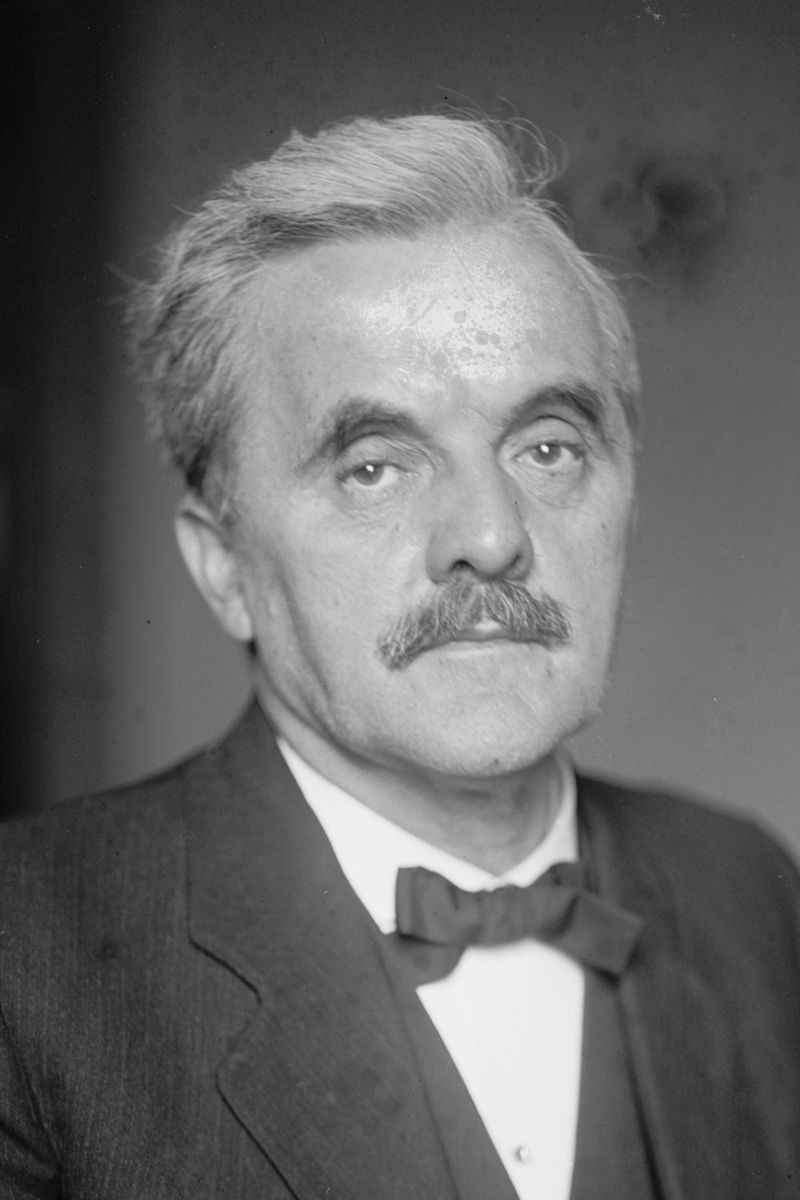 George W Norris
George W Norris
Norris was seasoned and he knew that it would be a long road, so he was ready in the Hoover administration with a second bill, re-worded but with the same effect, and it, too, passed, and this time it passed the through the conference committee and went to the president who dealt it a pocket veto.
When Norris presented his third version, Franklin Roosevelt was president, and Muscles Shoals became the first brick in the Tennessee Valley Authority. The hue and cry over the TVA raged for years but it came to be. See ‘The Wild River’ (1960) for the human side of the TVA.
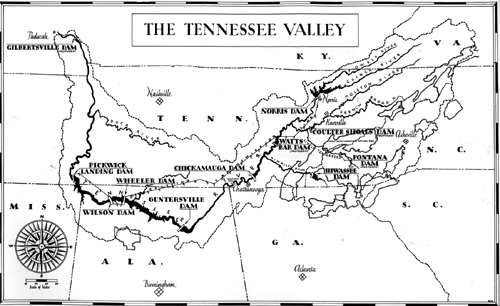 The TVA
The TVA
2. That the electricity produced by the damns sustained the second major theme of Norris’s career, Rural Electrification. Readers of ‘Sad Irons’ by Robert Caro know just how revolutionary electricity was in the lives of untold millions. This, too, was denounced as a Communist plot, along with fluoride in the water.
Few will realise how stoutly the advance of Rural Electrification was resisted. The arguments against it are the old chestnuts much in use today about the evils of big government and the corruption of the flesh by easy living. Having electricity on tap would sap the vital energies of the people, and thereby lay them open to ever greater repression conveyed by radio propaganda….. Yadda, yadda, yadda said the Ann Coulters of the day.
3. The Nebraska element is the unicameral legislature that remains unique among the fifty states. Norris had seen in Lincoln and in Washington how the two houses of a legislature work and arrived at a counter intuitive conclusion. The more representative the houses, the less representative was the legislation. Already this is too hard for an ABC journalist out to demonise someone.
Invariably the two houses would pass bills that differed from each other and these two versions would have to be reconciled in a conference committee, typically of five individuals. This is standard operating procedure, and it is still is. This reconciliation goes on behind closed doors an is usually reported to the two houses in a list of items at the close of session without debate or fanfare.
Norris had seen legislation completely changed by a conference committee of five. The greater the volume of legislation, the more was delegated to conference committees, the less oversight there was applied to them.
He started a one-man campaign for a unicameral legislature and he kicked off in Hastings on Platte to reform the Nebraska state legislature by making it unicameral to squeeze out of existence this process of the conference committee. In a one-house legislature, he reasoned, all business would have to be done in the house, i.e., in public.
He upped the ante by also insisting that this unicameral be non-partisan. His proposals offended both political parties and the Hearst Press, the ‘Omaha World Herald,’ which thundered against this double-edged communist proposal: doing the public business in public! The lies and calumny was dished out Fox News fashion.

Against this mighty array of forces, Norris had two even more powerful allies: The Dust Bowl and the Great Depression.
These catastrophes convinced many that things had to change. Business as usual was inadequate to either of these challenges. In 1934 Nebraska adopted a non-partisan unicameral legislature. The monumental state capital building, only recently completed, had allowed for a second smaller, upper house which then became used for, among other things, the venue for auditioning contestants in a state-song contest. Ever practical those children of the soil are on the Great Plains.
By 1936 Norris was persona non grata in the Republican Party and he ran for re-election as an independent. Norris won then, but in 1942 lost to a real Republican, Kenneth Wherry, who is perhaps best remembered for anticipating Ann Coulter in claiming that all homosexuals were subversives and perhaps the other way around, too. Wherry is accorded all honours in the Republican Hall of Fame and Norris is absent entirely.
‘Disturber of the Peace: The Life of H. L. Mencken’ (1951 [1986]) by William Manchester
‘Voltaire in Baltimore,’ said one admirer of the iconoclastic H. L. Mencken (1880-1956).
When I moved the copy of ‘The Creed of the Sage of Baltimore’ on my office pin-board a few weeks ago to re-arrange things, I posted it on Facebook. Doing that reminded me I had read William Manchester’s biography of the Sage in 1980. Now seemed a good time re-new acquaintance with this original. Trusty Amazon not only found a copy for me, but also revealed that there had been a second edition which I quickly acquired. To call Mencken an ‘original,’ as Manchester does is right, but it hardly seems enough – unique is better. Love him or hate him or both, he was one of a kind, a singularity.

This was a journalist who carried a baseball bat down his pant leg when he went to do interviews, supposing, rightly in some cases, that his questions would provoke physical violence, and he would have to defend himself. This was a newspaper editor who kept a shotgun on his desk when receiving complaints, a near daily occurrence, from members of the public. He would listen but he would not be cowed, that was the silent testimony of the shotgun. If the complainer was cowed, so much the better.
As a boy in the streets of Baltimore, he became fascinated with the machinery in a local shop, as many boys have been fascinated by trains or trucks. The local shop was the neighbourhood weekly newspaper/newsletter. He stood for hours after school watching it. His father gave him a toy printing press and was thus born ‘H. L. Mencken’ when he printed his own business cards with it. He had always gone by the name ‘Harry’ but all the ‘r’ letters in the set had been broken in his first experiments with it, so he styled himself ‘H. L.’ and it stuck.
When he left high school he applied for a job with the ‘Baltimore Herald’ and by persistence made a go of it. He loved the life and went at it like there was no tomorrow. This was a pace he continued for the rest of his life. But the newspaper’s readership fell in a very competitive market, and the desperate editor turned him loose. He was transformed from a journalist reporting events, to a columnist dishing out opinions. Is there nothing sacred? ‘No,’ was his reply.
Sanctimonious clergymen were target practice for his daily column. When they protested in a mass delegation to the newspaper’s owner, Mencken consulted his public and private files. The public files he had collected for sometime, recording incidents of clerical misdeeds with altar-boys, collection boxes, choirgirls, prostitutes, loan sharks, gamblers, you name it. These he recounted with unequaled enthusiasm. Still the clerics protested, so Mencken went to the private files.
 Mencken in his prime,
Mencken in his prime,
When he was but a reporter going where he was sent, doing what he told, he was a police reporter, and he was a very sociable drinker with police officers all over Baltimore. They provided him with still more dirt on churchmen that had not yet reached the public record. What a motherlode of gossip and libel did he find, and he did use it, having first mastered the libel laws! The clergy beat retreat, and having won, Mencken did not pursue them. There was still bigger game to hunt in the jungle of the sanctimonious.
Now blooded, he turned to the Baltimore political machine whose Mayor aspired to the spoils of a national office. Once again he published juicy extracts from the public record, connecting the dots, then he turned to the selfsame police officers for more dirt, which was supplied. But even that did not seem enough for so elephantine a target, so Mencken advertised in his column for citizens, in the strictest confidence, to confide in him information about the mayor. They did. Even he was surprised by the rapacious venality thus revealed, but this was a man for Augean stables. He treated it like a baseball game and created a scorecard, with day by day results in the race to the pennant.
His heritage was German, like many others in Baltimore, and he was proud of it. He loved German music and played the piano well on musical evenings with, first, the family, and then drinking buddies. When the Great War started, he saw it as Germany civilising Europe, and if Belgium, France, England got in the way, tough luck! His daily columns, whatever the subject matter, included an encomium to the Kaiser, Germany, mythical Germania, Bach, Nietzsche, or something else explicitly German. As the war went on and American neutrality leaned to Britain, he kept at it. While many Americans of German extraction admired his audacity, they kept their heads down.
His editor hoping to edify and distract him, sent him to Europe to cover the war. Europe? The editor gave him a steamship ticket to Southhampton and train ticket to London. The train ticket was never used. He changed ships at Southhampton for Oslo and then Copenhagen, and then bought his own train ticket to Berlin. Thence he proceeded to file dispatches from the Russian front, extolling German civility, cuisine, beer, courtesy, efficiency, etc. The editor cut off his funds and Mencken returned unrepentant. But seeing the war fervour back home, thereafter he had the wit to keep his own head down, but he never forgave Woodrow Wilson.
Then he turned his talents to editing a literary magazine. He it is that created the house style guide. His was the first to offer this service to contributors. Likewise he also was the first editor to declare what kind of stories he would publish as a guide to authors submitting. Finally, he vowed to treat authors with consideration and courtesy which was not the norm then or now. Submissions were reviewed and returned within 48 hours, and the letters of rejection or acceptance were hammered out on his typewriter. Those rejected got comments on the strong and weak points of the submission sometimes coupled with suggestions of other publications to try, and those accepted were bathed in flattery before he indicated just how little he could pay contributors. Having himself been rejected by editors with curt form letters rather like the disdainful treatment meted out by Qantas cabin staff when I used to fly with that carrier, he was trying to do unto other authors as he wished other editors to do unto to him.
In time he published stories by James Joyce, Sherwood Anderson, Scott Fitzgerald, Willa Cather, Theodore Dreiser, Edmund Wilson, Ernest Hemingway, Sinclair Lewis, Eugene O’Neill (plays in this case) and still more, when no one else would. He also pushed a young Alfred Knopf into publishing.
Perhaps his most lasting personal contribution was ‘The American Language’ which he prepared while staying his pen during the Great War. He was in part inspired to defend Americanese against the British, and their American sycophants, and so it was in part his private war against England in support of Germany. The other inspiration was the black slang he heard in the streets, the saloon talk of polyglot Baltimore, and frontier language of the west which he mostly knew through the works of one of his most beloved writers, Mark Twain. He likened Americanese to a new species of animal, living by its own rules in a new environment, quickly growing away from its origins (Britain). This was a hobby project but when it was published it obtained instant commercial and critical success, though he offended the self-appointed guardians of the King’s English stationed in the United States, and a war of words about words ensued.
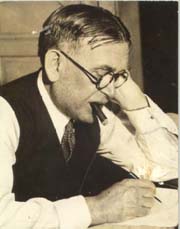 HL doing what he did best, editing,
HL doing what he did best, editing,
These guardians should have known better than to take on this master of polemic, venom, and invective. The more so because he had researched the material for many years before assembling it. Ergo, he had it down pat, and he shoved it down the throats of the guardians who assailed him. In time this grew to be a three-volume work, as he tinkered with it for the rest of his life.
The Scopes Monkey trial is well known, and he was the conductor of the orchestra there. He recruited Clarence Darrow for the defence and blackmailed his paper into paying Darrow’s considerable fee.
He fought Prohibition in every way, from brewing his own beer to the pages of the newspapers far and wide and insulted, mocked every dry clergyman, condemned whole swaths of the nation for supporting such idiocy and just would not shut up. This fight gave him an even greater national profile, since many intellectuals, with secure private supplies from bootleggers, did not fight the good fight on this one.
More battles followed. One of his magazines was ‘Banned in Boston’ as was much else at the time, and he let it go, but when the Bostonians started bragging about caging the Beast of Baltimore, what was a man to do, but fight back? He went to Boston Common and sold copies of the offending magazine himself where he was arrested. At the police station he regaled his incarcerators with stories from his days as the police roundsman in Baltimore, while his lawyer did the heavy lifting. The scorecard read: Mencken 1 – Boston Banners – 0. The judge, who had been handpicked by the Banners, found for Mencken, free speech and all that.
When the good citizens of a Maryland Eastern Shore town lynched a negro, dragged from a hospital bed, Mencken fired his heaviest artillery. These great men proved everything he had ever thought about the scum of the earth. Did he go hard! Wallop! When commercial and physical threats against the newspaper and his person rolled in, he redoubled his invective. Crosses were dutifully burned. Dead animals left on his doorstep. All the tricks that are still in the Tea Party playbook were used. Nothing stopped him. He just kept at it until the villains went on to other, softer targets. Remember what I said earlier about the baseball bat and the shotgun.
Alas, Manchester includes none of Mencken nonpareil coverage of presidential nominating conventions and elections. He loved the circus, and democracy offered the biggest and best one for free. He was present at the hung convention in 1924 and must have had a lot to say about that. By the time he covered his last presidential convention in 1948, he was a bigger celebrity than most of the candidates. Journalist crowded around to interview him, while hapless candidates milled around the auditorium talking to each other.
He was an iconoclast who attacked hot air, bunkum, lies, pomposity, pretention, vain-glory, stupidity, ignorance at every turn, and if one attack was good three or four were better. Indeed, his modus operandi became so well known that one well-meaning friend asked him if there was anything he did believe in, and the result was the Sage’s creed.
Manchester offers no summing up of Mencken’s life, legacy, or impact. My own is this. Puncturing balloons is great fun, and there are plenty of hot air balloons around to puncture, and most of them have so little self-knowledge that they do not know that they are full of hot air. In this, as in so much else though, one has to know when to quit, and Mencken did not. He was like a Groucho Marx who just keeps rabbiting on ridiculing all about him, and with age Mencken became far less discerning in the targets he selected. Neither the Great Depression nor the rise of Adolf Hitler could he take seriously and so his star waned. Just as William Jennings Bryan clung to old verities, in his age so did Mencken.
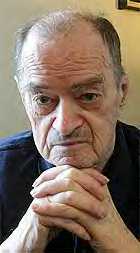 William Manchester
William Manchester
Moreover, Mencken was not wholly negative. He loved baseball his whole life and never said a bad word about it, not even during the Black Sox scandal. He had a blind eye there. Manchester barely mentions the sport but one reason Mencken went to New York City as often as he did was to see Yankee games.
When I visited Baltimore for a conference, I spent far too much time conferring, and did not make it to the Mencken Room, which is only grudgingly open now and again. Likewise I did not do an Edgar Alan Poe homage such was my professional fervour, long since outgrown. I did make it to an Orioles game though! I did go over the submarine in the harbour, and I did see Fort McHenry from the water with a boatload of sozzled conferees.
The second-hand copy Amazon produced is marked up, doing the same myself with most books I read, I sometimes wonder about the marker. Is this someone I would get along with? I try to see some pattern in the mark-up. The marks in this book seem to be analysis of Manchester’s style, his choice of voice — third person past, the mix of description and anecdote, the passive versus active voice. I wonder if the writer was an author. The copperplate penmanship suggests a woman but I have been fooled on that before.
Speaking of marked up texts, as an undergraduate, I had developed a method for selecting used textbooks that worked perfectly.
First I only looked at copies that were highlighted in yellow. Why? Read on and be enlightened. Second I concentrated on those yellow highlighted copies that were densely marked in the opening chapters. Yes, there is a method to this. And remember I was buying in a crowded bookstore with many other students getting books for the semester, so there was physical and social pressure to get on with it.
Ah, the method? I discovered by the end of the freshman year texts that were marked in yellow were used by dolts more interested in the yellow marker than any meaning the text might impart. The yellow highlighter was a novelty in those days and only a few students used them, and they used them, it seemed, more as a status symbol than anything else. Why do I say that? Because the highlighting stopped within a chapter or two. Either the reader dropped the course, give up to failure, or relied on copying the work of others. Law One was: A text highlighted in yellow was likely to be clean after a few chapters.
As a corollary to this law, I also noticed that the more densely marked the first chapter was, the sooner the marking stopped. Someone who highlighted every line on page one, had no idea what was important and what was not. Such an indiscriminate marker was destined, know it or not, to drop even sooner than the average Yellow-Head, as I called them to myself. Law Two was: the more frequent the yellow in Chapter One the sooner the highlighting would stop, leaving the remainder of the text untouched.
A few times a friend expressed surprise to see me pick a book that was heavily marked in the opening pages, but I gave a spurious reason, about that marking saving me the work of doing it myself, rather than reveal the two laws above! These I kept to myself until now.
Mencken’s Creed for those too lazy to look it up for themselves. It is sometimes edited to suit the quoter.
I believe that religion, generally speaking, has been a curse to mankind – that its modest and greatly overestimated services on the ethical side have been more than overcome by the damage it has done to clear and honest thinking.
I believe that no discovery of fact, however trivial, can be wholly useless to the race, and that no trumpeting of falsehood, however virtuous in intent, can be anything but vicious.
I believe that all government is evil, in that all government must necessarily make war upon liberty and the democratic form is as bad as any of the other forms.
I believe that the evidence for immortality is no better than the evidence of witches, and deserves no more respect.
I believe in the complete freedom of thought and speech alike for the humblest man and the mightiest, and in the utmost freedom of conduct that is consistent with living in organized society.
I believe in the capacity of man to conquer his world, and to find out what it is made of, and how it is run.
I believe in the reality of progress.
I – But the whole thing, after all, may be put very simply. I believe that it is better to tell the truth than to lie. I believe that it is better to be free than to be a slave. And I believe that it is better to know than be ignorant.
‘Jeremy Bentham on Spanish America’ (1980) by Miriam Williford
Reading about John Stuart Mill brought to mind Mr Utilitarianism Jeremy Bentham (1748-1832), and I remembered that I had acquired a copy of this book years ago as relevant to utopia, though many might suggest one criterion of utopia would be the absence of insufferable bores like JB, as he referred to himself. While not a biography, the book does convey much of Bentham’s personality and habits.
The subtitle explains the remit of the monograph, ‘An Account of his Letters and Proposals for the New World.’

JB proselytised far and wide in England. He started out in law but when his parents’ deaths left him well off he became a full-time know-it-all. He wrote one tract after another, many are legal in orientation, and sent them off to one and all to influence opinion and incite action. He eschewed running for parliament on the ground that the duties thereof would distract from his broader and deeper influence. He ranged over many subject and topics, ignorance being no bar. Altogether a public intellectual!
Then he hit on the idea of the panopticon and devoted himself nearly exclusively to that for years, and sunk a lot of his own money into it. It started out as a model prison but as he honed the idea it became a more general social model. It is all in the name ‘pan’ = ‘all’ and ‘opticon’ = ‘seeing.’ All-seeing, a building made of glass so that everyone could see what each person is doing at all times. Little Brothers and Sisters are always watching! The social discipline born of this exposure would put us all on our best behaviour all the time. Michel Foucault has some things to say about this that are worth reading.
Disaffected by the failure of the Great British to embrace his panopticon, JB turned his gaze to the wider world, and there he saw Spanish America. This was a greenfield site in his mind. New societies were aborning there, and if they started off on the right foot, they would grow into perfect little Benthamic societies. He would be only too glad to tell them about that right foot.
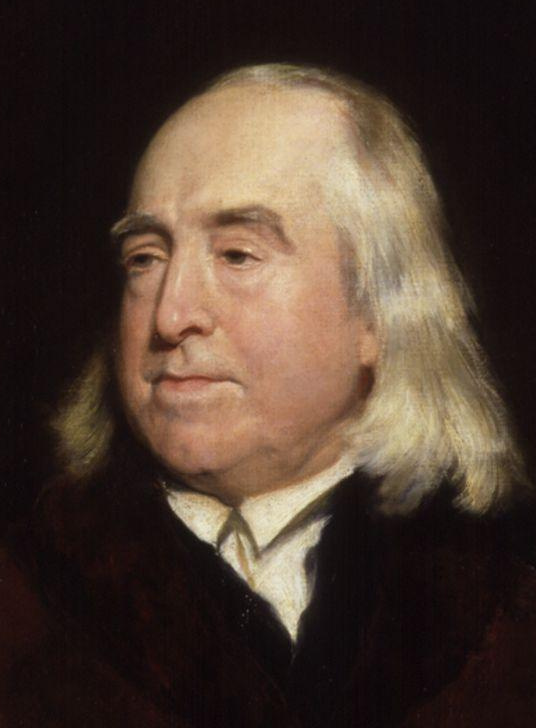 God’s gift to humanity, Jeremy Bentham
God’s gift to humanity, Jeremy Bentham
Cue, another prodigious letter-writing campaign, and more tracts. Since he paid for the publication of his tracts they were not edited, and seldom reviewed. That may explain why most of them are so excruciating bad. Neither self-criticism nor second-thoughts featured in his personality. His contemporaries can be grateful that for every tract published he wrote two others that had to await posthumous publication in his collected works now safely confined to research library shelves for the terms of their natural lives.
The circumstances were a bit tricky, as reality can be. While Spain still claimed and asserted suzerainty over Spanish America, and these claims and assertions were largely respected by European powers, the Spanish Americans were rebelling against rule from Spain, imposed locally by appointees whose main goal was to enrich themselves with the least possible effort. San Martín, Símon Bolívar, and others were in revolt. These niceties did not bother JB, he wrote to Madrid, to Spanish colonial governors, and to the rebels offering his services as a lawgiver. Solon, reborn! Have laws, will travel.
In doing so he promoted his own considerable expertise as evinced by his numerous tracts, which he usually enclosed with his letters, and he cited testimonials from heads of states (who had never heard of him), savants (who regarded him as a crackpot), and religious leaders (who rejected him as an atheist).
Never one to stand on ceremony, while he was wooing the Madrid government to let him dictate to its restive colonies, he managed to find time to offer 400 pages of criticisms of the Madrid government, its constitution, its acts…. What a pompous prat, one might think.
More seriously, he suggested that his complete ignorance of local circumstances, and existing manners and morēs (or knowledge of Spanish) ideally suited him for the job, leaving him dispassionate, detached, unfettered, and rational. In short, he claims some of the qualities that Plato ascribed to Philosopher-Kings, though he never cites Plato, or anyone else for that matter. It is JB all the way, unalloyed.
He did make plans to travel to Mexico at one time, and then at another Venezuela but neither eventuated. Nonetheless, he continued his barrage of letters and tracts.
Imagine now a besieged Spanish governor in Peru with insurgents at the door, nearly all communication to the interior cut by Indians, receiving a letter…from Bentham running to 25 pages about whether the legal code should be written in italics or not. Bentham often seized on such trivial details and spent pages and pages on them, while the castle burned down. He had neither practical sense nor political nous. Though, surprisingly enough, some of his correspondents did take him seriously like Símon Bolívar, giving me cause to doubt SB’s wisdom. (Maybe I should read a biography of SB.)
Williford charts all this deadpan, resisting all but a few asides on the evident megalomania. This is an excellent, short monograph that shows a considerable volume of research, effectively marshalled to say what needs to be said with little fuss. Perhaps it started as PhD but if so the published version escaped the PhD-to-book syndrome – overkill.
I could not find a picture of the author.
I confess that I have a marked up copy of Bentham’s ‘Fragment on Government’ which I had to read in a graduate seminar, and I cannot remember one thing about it, except the relief at never having to look at it again.
In pursuit of John Stuart Mill I have also recently read Eric Stokes, ‘The English Utilitarians and India’ (1989) which I chose not to review, finding it so densely detailed that only a specialist in British colonialism in India could fathom it. I certainly could not, though I found informative the distinctions Stokes made among the Whig, Liberal, and Utilitarian approach to India. For the Whigs government itself is the enemy. For the Liberals education solves all problems when mixed with time. For Utilitarians there is no substitute for telling people what to do, how to do it, when to do it, and, if time permits, why to do it.
By the way, when Bentham’s parents’ estate was divided between the two sons, his brother took his half of the dosh and moved to the south of France to pursue the life of a sybarite. Who can say which was the greater service to later generations?
